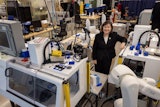Any application involving moving machinery and constant repetitive motion will benefit from a cable carrier system. In recent years, plastic cable carriers have emerged as an alternative to metal and steel cable carriers and have replaced these types of systems on most kinds of automated machinery. Nowadays, plastic cable carriers can achieve almost anything metal or steel can and due to their polymer construction—they offer lower cost, reduced weight, and are corrosion-resistant.
A Canadian-based manufacturer—which specializes in digitally controlled CNC routers and plasma tables designed to cut a variety of materials, including plastics, textiles, steel, wood, granite, and marble—needed to protect vital power and control cables on its machines. During the cutting process, flying debris can damage cables and lead to costly maintenance and unwanted downtime. To avoid this, plastic cable carriers are used on every industrial cutter. The plastic cable carriers also withstand the harsh environment and demanding operating schedule of the machines, which requires some of them to run 24 hours a day, seven days a week.
Every machine uses a specially-designed cable carrier system, the "Roll-E-Chain" from igus®, on each of its three axes. Rol-E-Chain features built-in wheels to facilitate travel over longer distances. The wheels are integrated into the cable carrier’s side links so friction is decreased and the drive power required to move the cable carrier is reduced by more than 25 percent.
The fully enclosed version of the Rol-E-Chain is used and equipped with interior separators. The enclosed design protects cables from a variety of environmental elements, including dirt, hot metal chips, steel shards, and sawdust, while the interior separators prevent the cables from chafing, twisting, or corkscrewing. The cable carrier system is also able to handle the machine’s high speeds and extreme loads, which can reach 125 feet-per-minute and 9,000 pounds, respectively.
While metal and steel cable carriers were an option, all-plastic cable carriers were chosen for a number of reasons. They are quieter and less expensive, and because they are corrosion- and wear-resistant, they do not require frequent maintenance.
A manufacturer of various types of industrial lifting equipment also discovered the benefits of plastic cable carriers when it started using them on its line of gantry cranes, predominately used in paper mills. The company was able to eliminate festoon systems that were corroding and failing on the cranes. The festoons could not handle the dirty, wet environment where temperatures peak at 125°F and are accompanied by 100 percent humidity levels. In addition, the festoons did not adequately protect the cables, which were often times left whipping and swinging around uncontrollably.
A ReadyChain® pre-harnessed cable carrier system from igus, complete with cable carrier and continuous-flex cables, is mounted horizontally on each gantry crane to guide and protect more than 250 feet of power cable. The plastic cable carriers are less expensive than the festoon systems and have drastically reduced downtime thanks to their space-saving, corrosion-resistant features. They also eliminated maintenance, including regular greasing and wheel replacement.



















